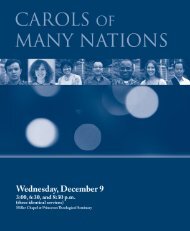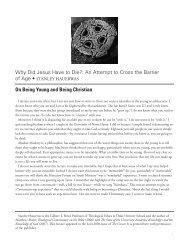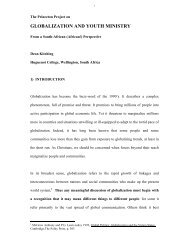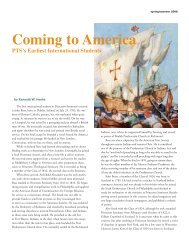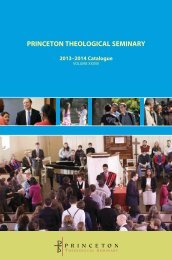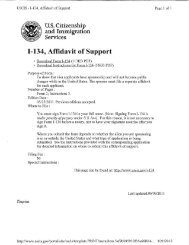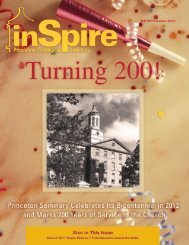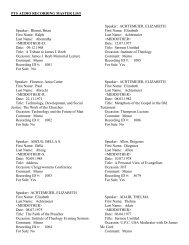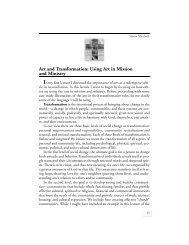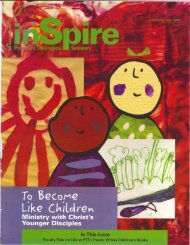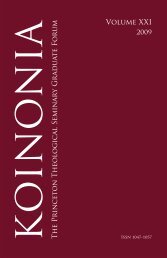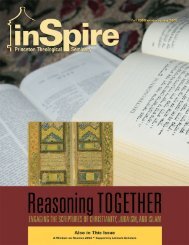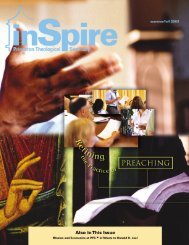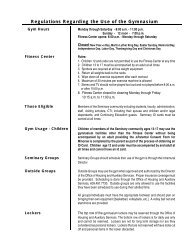P E R S P E C T I VAS - Princeton Theological Seminary
P E R S P E C T I VAS - Princeton Theological Seminary
P E R S P E C T I VAS - Princeton Theological Seminary
Create successful ePaper yourself
Turn your PDF publications into a flip-book with our unique Google optimized e-Paper software.
Perspectivas/Occasional Papers • Fall 2006Perspectivas/Occasional Papers • Fall 2006became flesh, and dwelt among us, …” This, I believe, is the apostle’sway of saying that the Christ of faith put on particularity. TheWord or Logos put on social location, specifically marginality, as aGalilean Jew. As the son of peasants, Jesus of Nazareth experiencedthe plight of immigrants who flee their countries of originto escape all kinds of persecution. To put flesh on the imago Dei inour context is to see God encarnado, made flesh, in Jesus the homelessJew and in those who come to us in like manner. Our contextbeckons us to examine His life from the perspective of the fron -teras, the margins and middle zone where He lived and ministered.Immigrants and native folks in our context relate well tothis image of God as Jesus the immigrant and homeless Jewbecause their experience is so similar.Jesus was also born in Nepantla, a middle zone where culturesand peoples met and intermingled. He probably spoke a form ofmestizo Greek and Aramaic similar to our own hybrid language ofthe borderlands. For Lutherans, whose confessional mantra is solagracia, sola fide, and sola scriptura, the confession of John serves notonly to highlight a Christocentric statement of faith, but also a culturalembodiment of divinity made flesh in the person of Jesus theGalilean mestizo. For Hispanic Lutherans in particular, one cannotavoid dismissing the nature of the Word made flesh in a mestizoand homeless Jew whose life mirrors their own in so many ways.In Nepantla, the Word puts on flesh in the lives and experience ofthe immigrants and native peoples who have lived on the marginsof the frontera, the borderlands of the United States and Mexico.To put flesh on the image of God that is the church in Nepantla,allow me to indicate some signifiers that I observed in the praxisof my own ministry while serving a parish in this city severalyears ago. In this borderland region where we find ourselves, theChurch embodies the imago Dei in acts of service to the stranger, inhospitality that welcomes all people to our sacred spaces, and inacts of justice for the poor and the voiceless. While serving as a76pastor of a predominantly Anglo community, I took part in formingthe South Side San Antonio Alliance, an organization of areachurches that sought to serve the neighbor in visible and tangibleways. Churches of various traditions and confessions actedtogether to serve our community in such ministries as meals onwheels, youth advocacy and gang prevention, as well as advocacyfor the undocumented and those without a voice. We tooksteps to make our worship culturally relevant and to incorporatethe language of the people of our community in small but significantways. We made hospitality a primary focus of our selfunderstandingas a church in mission.We also took part in the annual Thanksgiving Day service andmeal for the community that the Jiménez Family of San Antonioholds annually for anyone and everyone who may be homeless orwithout family during the holidays. Along with many volunteerswe served hundreds of meals to the homeless and the undocumented,the poor, the lonely, and the forgotten. Everyone wasserved. No one was asked for documents. In this fiesta, citizenshipstatus or the green card was irrelevant and of no consequence.This was table fellowship at its best and a sign of thekin-dom of God among us. It crossed denominational and culturaldifferences, ethnicities, social classes, political affiliations, andlanguage barriers. This was a fiesta of the citizenship of the kindomof God where borders and barriers do not exclude anyoneand where everyone is invited to the fiesta.In Austin, one clearly sees the imago Dei embodied in acts ofservice and hospitality, such as at St. John/San Juan LutheranChurch, where both Anglo and Hispanic laity serve by offeringtheir gifts of worship and leadership. Central Americans who fledthe war in El Salvador years ago find in this predominantly Anglocommunity a place of cultural affirmation and a safe place ofbelonging. Their unique gifts and leadership are valued and recognizedas gifts of service in the kin-dom of God. Our seminary77



